AM I Saved 4
Chris Knepp



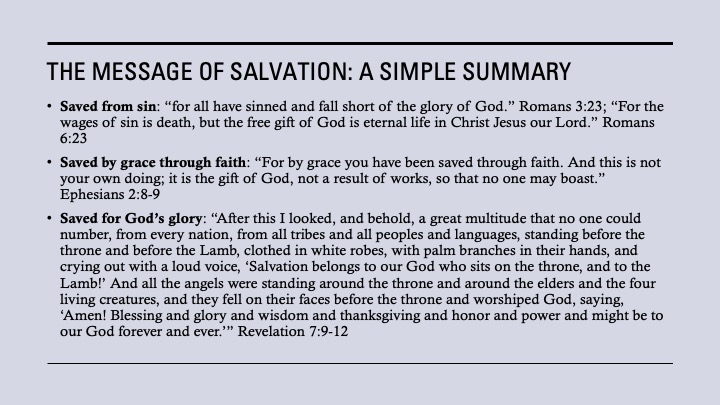
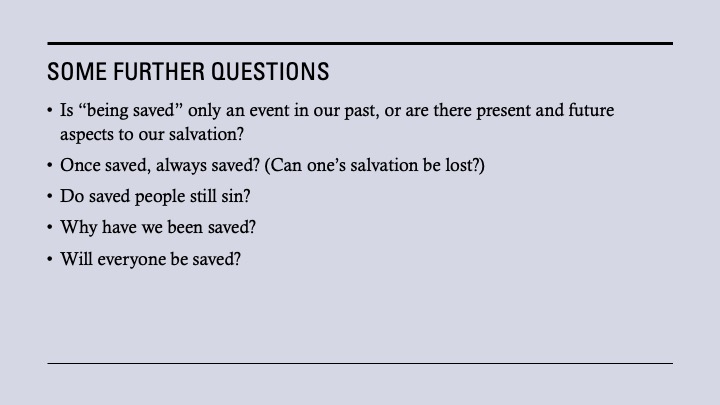
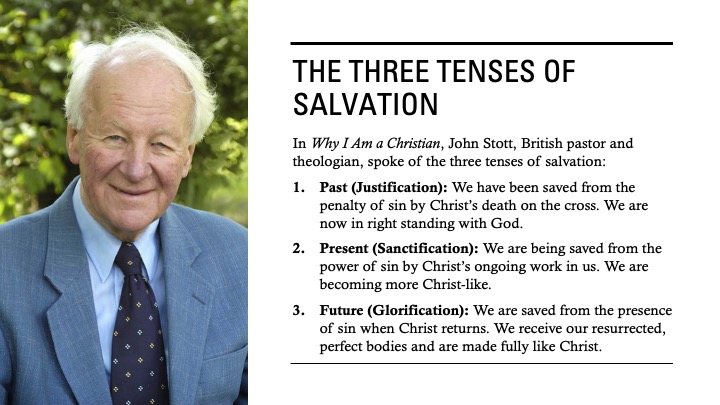
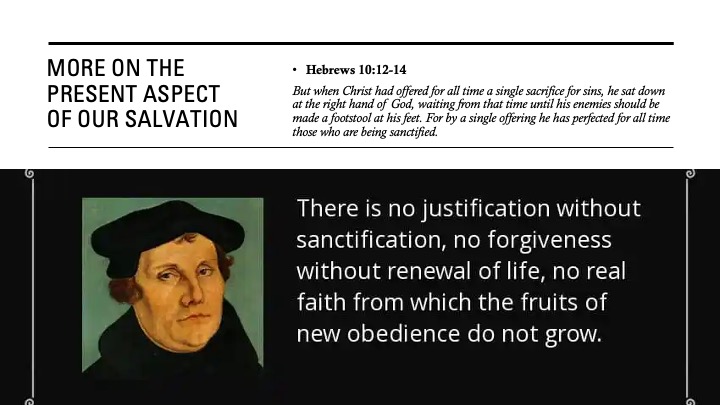



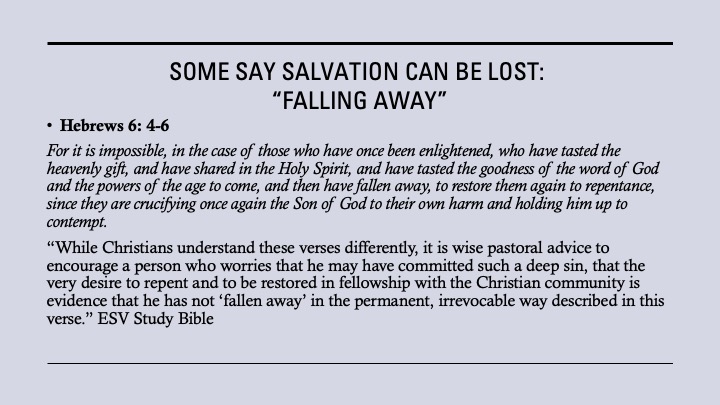
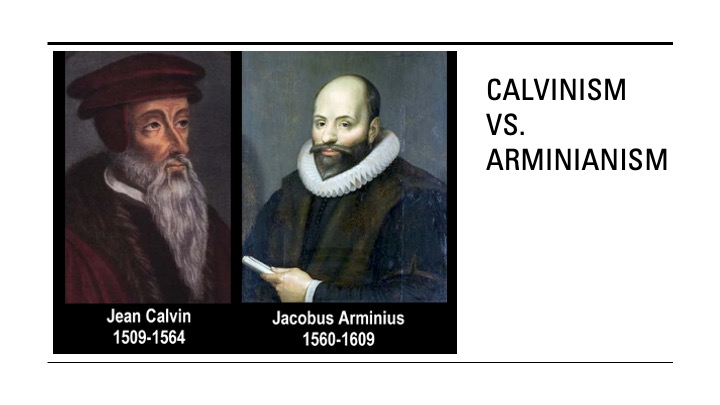
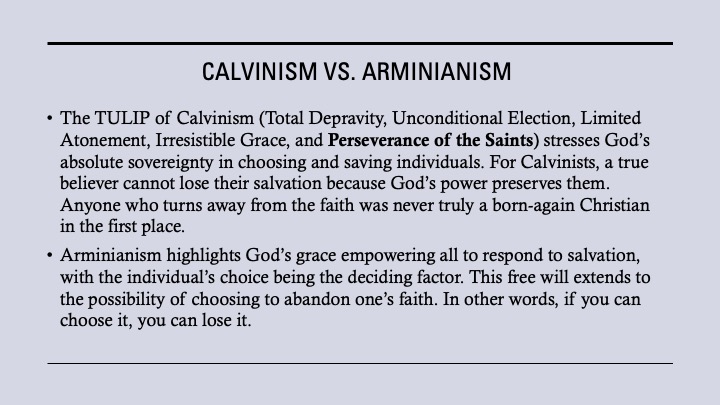


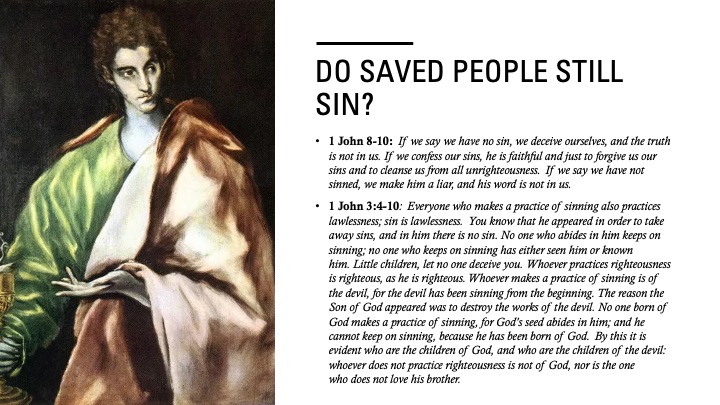

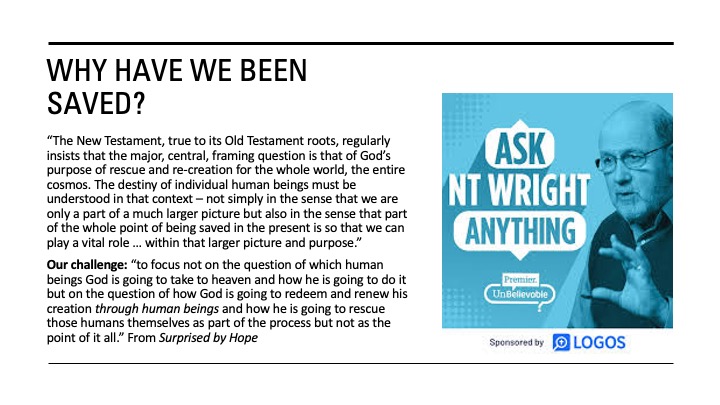
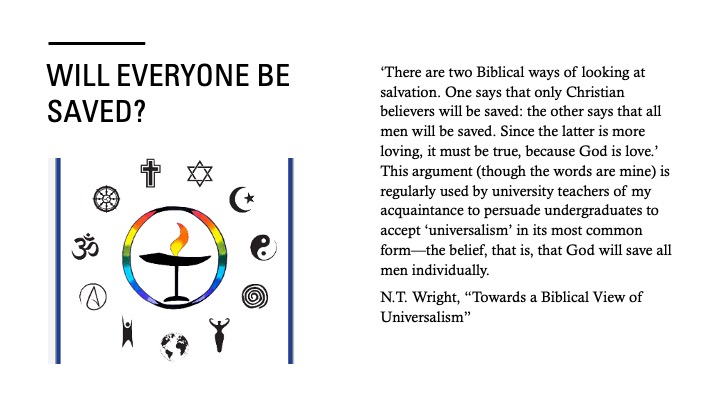
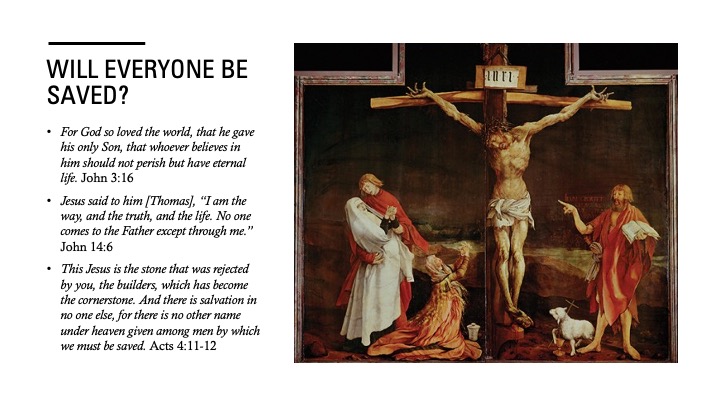

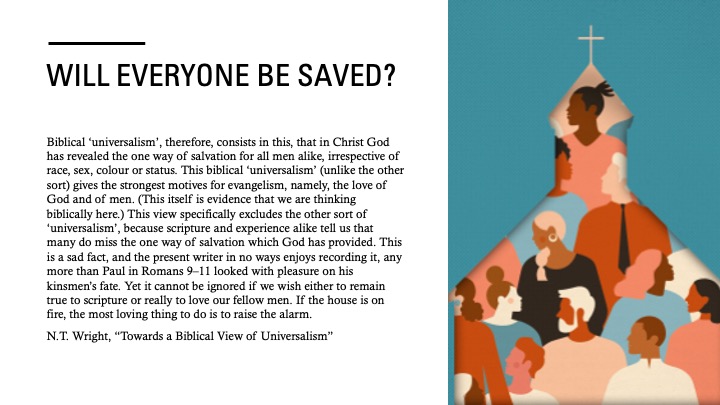

AM I Saved 4
Links
<< Home >> << Am I Saved Menu >>
Am I saved Week 4 - The Text
Am I Saved? 4. The Text
Am I Saved?
And now what?
Hallelujah!
Praise the Lord!
I’m saved!
NOT SO FAST, MY FRIEND!
Matthew 7:21-23
What seems to be the problem here?
21 “Not everyone who says to me, ‘Lord, Lord,’ will enter the kingdom of heaven, but the one who does the will of my Father who is in heaven. 22 On that day many will say to me, ‘Lord, Lord, did we not prophesy in your name, and cast out demons in your name, and do many mighty works in your name?’ 23 And then will I declare to them, ‘I never knew you; depart from me, you workers of lawlessness.’
The message of salvation: A simple summary
• Saved from sin: “for all have sinned and fall short of the glory of God.” Romans 3:23; “For the wages of sin is death, but the free gift of God is eternal life in Christ Jesus our Lord.” Romans 6:23
• Saved by grace through faith: “For by grace you have been saved through faith. And this is not your own doing; it is the gift of God, not a result of works, so that no one may boast.” Ephesians 2:8-9
• Saved for God’s glory: “After this I looked, and behold, a great multitude that no one could number, from every nation, from all tribes and all peoples and languages, standing before the throne and before the Lamb, clothed in white robes, with palm branches in their hands, and crying out with a loud voice, ‘Salvation belongs to our God who sits on the throne, and to the Lamb!’ And all the angels were standing around the throne and around the elders and the four living creatures, and they fell on their faces before the throne and worshiped God, saying, ‘Amen! Blessing and glory and wisdom and thanksgiving and honor and power and might be to our God forever and ever.’” Revelation 7:9-12
Some further Questions
• Is “being saved” only an event in our past, or are there present and future aspects to our salvation?
• Once saved, always saved? (Can one’s salvation be lost?)
• Do saved people still sin?
• Why have we been saved?
• Will everyone be saved?
The Three Tenses of Salvation
In Why I Am a Christian, John Stott, British pastor and theologian, spoke of the three tenses of salvation:
- Past (Justification): We have been saved from the penalty of sin by Christ’s death on the cross. We are now in right standing with God.
- Present (Sanctification): We are being saved from the power of sin by Christ’s ongoing work in us. We are becoming more Christ-like.
- Future (Glorification): We are saved from the presence of sin when Christ returns. We receive our resurrected, perfect bodies and are made fully like Christ.
More on The present Aspect of Our Salvation
• Hebrews 10:12-14
But when Christ had offered for all time a single sacrifice for sins, he sat down at the right hand of God, waiting from that time until his enemies should be made a footstool at his feet. For by a single offering he has perfected for all time those who are being sanctified.
Martin Luther
There is no justification without sanctification, no forgiveness without renewal of life, no real faith from which the fruits of new obedience do not grow.
More on The Future Aspect of Our Salvation
• Romans 5:8-9
but God shows his love for us in that while we were still sinners, Christ died for us. Since therefore, we have now been justified by his blood, much more shall we be saved by him from the wrath of God.
“Christians are now justified (declared to be in the right before God) by virtue of Christ’s blood, that is, his blood poured out in his death on the cross. Therefore, they can be sure that they will be saved on the day of judgment from God’s wrath.” ESV Study Bible, emphasis original
Can Salvation be Lost? It depends on who you ask.
Some say salvation cannot be lost:
Eternal Security
• John 6:39-40
And this is the will of him who sent me, that I should lose nothing of all that he has given me, but raise it up on the last day. For this is the will of my Father, that everyone who looks on the Son and believes in him should have eternal life, and I will raise him up on the last day.
• John 10:27-30
My sheep hear my voice, and I know them, and they follow me. I give them eternal life, and they will never perish, and no one will snatch them out of my hand. My Father, who has given them to me, is greater than all, and no one is able to snatch them out of the Father’s hand. I and the Father are one.”
But Some say salvation can be lost:
“Falling away”
• Hebrews 6: 4-6
For it is impossible, in the case of those who have once been enlightened, who have tasted the heavenly gift, and have shared in the Holy Spirit, and have tasted the goodness of the word of God and the powers of the age to come, and then have fallen away, to restore them again to repentance, since they are crucifying once again the Son of God to their own harm and holding him up to contempt.
“While Christians understand these verses differently, it is wise pastoral advice to encourage a person who worries that he may have committed such a deep sin, that the very desire to repent and to be restored in fellowship with the Christian community is evidence that he has not ‘fallen away’ in the permanent, irrevocable way described in this verse.” ESV Study Bible
Calvinism VS. Arminianism
• The TULIP of Calvinism (Total Depravity, Unconditional Election, Limited Atonement, Irresistible Grace, and Perseverance of the Saints) stresses God’s absolute sovereignty in choosing and saving individuals. For Calvinists, a true believer cannot lose their salvation because God’s power preserves them. Anyone who turns away from the faith was never truly a born-again Christian in the first place.
• Arminianism highlights God’s grace empowering all to respond to salvation, with the individual’s choice being the deciding factor. This free will extends to the possibility of choosing to abandon one’s faith. In other words, if you can choose it, you can lose it.
Can I Lose My Salvation?
“The question of losing one's salvation is one that is a matter of great controversy within the household of Christian faith. There are many Christians who live in mortal fear every day of losing what they have found in Christ because the Bible gives serious warnings about falling away, and Paul himself says that he has to be very careful lest he himself become a castaway. There are biblical warnings about what would happen if we turn our backs on Christ after we've come to a knowledge of him….
But I'm convinced that the Bible teaches that what God begins in our life, he finishes. Paul teaches, for example, in Philippians, "He who has begun a good work in you will perfect it to the end." My confidence rests in the fact that Jesus promises to intercede for me daily as my Great High Priest. My confidence for my future salvation rests in my confidence that God will keep his promise and that Christ will intercede for me and preserve me. Again, if it were left to me, I would obviously fall away. I like to look at it this way: I'm walking the Christian life with my hand in God's hand. If my perseverance depended upon my holding tightly to God's hand, I would surely fall away because at some point I would let go. But I believe that the Scriptures teach us that God is holding my hand, and because he is holding my hand, I don't have to fear that I will fall ultimately and finally.”
Do saved people still sin?
• Romans 7:14-20: For we know that the law is spiritual, but I am of the flesh, sold under sin. For I do not understand my own actions. For I do not do what I want, but I do the very thing I hate. Now if I do what I do not want, I agree with the law, that it is good. So now it is no longer I who do it, but sin that dwells within me. For I know that nothing good dwells in me, that is, in my flesh. For I have the desire to do what is right, but not the ability to carry it out. For I do not do the good I want, but the evil I do not want is what I keep on doing. Now if I do what I do not want, it is no longer I who do it, but sin that dwells within me.
Do saved people still sin?
• 1 John 8-10: If we say we have no sin, we deceive ourselves, and the truth is not in us. If we confess our sins, he is faithful and just to forgive us our sins and to cleanse us from all unrighteousness. If we say we have not sinned, we make him a liar, and his word is not in us.
• 1 John 3:4-10: Everyone who makes a practice of sinning also practices lawlessness; sin is lawlessness. You know that he appeared in order to take away sins, and in him there is no sin. No one who abides in him keeps on sinning; no one who keeps on sinning has either seen him or known him. Little children, let no one deceive you. Whoever practices righteousness is righteous, as he is righteous. Whoever makes a practice of sinning is of the devil, for the devil has been sinning from the beginning. The reason the Son of God appeared was to destroy the works of the devil. No one born of God makes a practice of sinning, for God's seed abides in him; and he cannot keep on sinning, because he has been born of God. By this it is evident who are the children of God, and who are the children of the devil: whoever does not practice righteousness is not of God, nor is the one who does not love his brother.
• John is not contradicting himself!
• “… because the Word is present in the believer’s heart through the work of the Spirit, the believer cannot keep on sinning. Thus, the hearts of genuine Christians (those who are truly children of God) have been so transformed that they cannot live in a pattern of continual sin – though this does not mean that Christians are ever completely free from sin in this life.” ESV Study Bible, emphasis original
Why have we been saved? Let’s add one more verse to our key passage for this study….
8 For by grace you have been saved through faith. And this is not your own doing; it is the gift of God, 9 not a result of works, so that no one may boast. 10 For we are his workmanship, created in Christ Jesus for good works, which God prepared beforehand, that we should walk in them. Ephesians 2:8-10
Why have we been saved?
“The New Testament, true to its Old Testament roots, regularly insists that the major, central, framing question is that of God’s purpose of rescue and re-creation for the whole world, the entire cosmos. The destiny of individual human beings must be understood in that context – not simply in the sense that we are only a part of a much larger picture but also in the sense that part of the whole point of being saved in the present is so that we can play a vital role … within that larger picture and purpose.”
Our challenge: “to focus not on the question of which human beings God is going to take to heaven and how he is going to do it but on the question of how God is going to redeem and renew his creation through human beings and how he is going to rescue those humans themselves as part of the process but not as the point of it all.” From Surprised by Hope
Will everyone be saved?
‘There are two Biblical ways of looking at salvation. One says that only Christian believers will be saved: the other says that all men will be saved. Since the latter is more loving, it must be true, because God is love.’ This argument (though the words are mine) is regularly used by university teachers of my acquaintance to persuade undergraduates to accept ‘universalism’ in its most common form—the belief, that is, that God will save all men individually.
N.T. Wright, “Towards a Biblical View of Universalism”
• For God so loved the world, that he gave his only Son, that whoever believes in him should not perish but have eternal life. John 3:16
• Jesus said to him [Thomas], “I am the way, and the truth, and the life. No one comes to the Father except through me.” John 14:6
• This Jesus is the stone that was rejected by you, the builders, which has become the cornerstone. And there is salvation in no one else, for there is no other name under heaven given among men by which we must be saved. Acts 4:11-12
But what about…?
• Therefore, as one trespass led to condemnation for all men, so one act of righteousness leads to justification and life for all men. Romans 5:18
• For God has consigned all to disobedience, that he may have mercy on all. Romans 11:32
• First of all, then, I urge that supplications, prayers, intercessions, and thanksgivings be made for all people…. This is good, and it is pleasing in the sight of God our Savior, who desires all people to be saved and to come to the knowledge of truth. 1 Timothy 2:1-4
• For to this end we toil and strive, because we have our hope set on the living God, who is the Savior of all people, especially of those who believe. 1 Timothy 4:10
• The Lord is not slow to fulfill his promise as some count slowness, but is patient toward you, not wishing that any should perish, but that all should reach repentance. 2 Peter 3:9
Will everyone be saved?
Biblical ‘universalism’, therefore, consists in this, that in Christ God has revealed the one way of salvation for all men alike, irrespective of race, sex, color or status. This biblical ‘universalism’ (unlike the other sort) gives the strongest motives for evangelism, namely, the love of God and of men. (This itself is evidence that we are thinking biblically here.) This view specifically excludes the other sort of ‘universalism’, because scripture and experience alike tell us that many do miss the one way of salvation which God has provided. This is a sad fact, and the present writer in no ways enjoys recording it, any more than Paul in Romans 9–11 looked with pleasure on his kinsmen’s fate. Yet it cannot be ignored if we wish either to remain true to scripture or really to love our fellow men. If the house is on fire, the most loving thing to do is to raise the alarm.
N.T. Wright, “Towards a Biblical View of Universalism”
Last words
• “This much is certain, that we have no theological right to set any sort of limits to the loving-kindness of God which has appeared in Jesus Christ. Our theological duty is to see and understand it as being still greater than we had seen before.” Karl Barth, The Humanity of God
• Barth’s most famous statement on universalism: “I don’t teach it [universalism], but I don’t not teach it.”